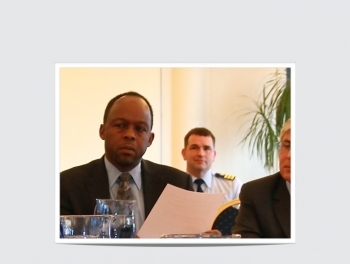Feb272014
Posted at 12:03 PM
Ed. note: This post is part of the Spotlight on Commerce series highlighting members of the Department of Commerce and their contributions to an Economy Built to Last.
Guest blog post by Russell F. Smith III, National Oceanic and Atmospheric Adminstration
As the deputy assistant secretary for international fisheries at the National Oceanic and Atmospheric Administration, I oversee the nation’s engagement in international fisheries. My responsibilities include providing general policy guidance on various aspects of NOAA’s international fisheries work, such as sustainable management of fisheries, the protection of marine resources, and supporting the export of U.S. fisheries products. I also represent the U.S. government at various international meetings. In carrying out these responsibilities, I work closely with other NOAA employees and government officials from other agencies, including the State Department, the Coast Guard and the Office of the U.S. Trade Representative. In addition, I frequently consult with various stakeholders, including representatives of the fishing industry, non-governmental organizations, and academia. I also regularly work with representatives of foreign countries.
As Americans, we care about the global management of our oceans for a number of reasons. Seafood is an important and healthy source of protein in the diets of many Americans and many others in the world. The seafood industry provides many jobs for fishermen and women, as well as those that build their boats and gear, seafood processors, suppliers, and many others. Although many once thought that seafood was an endless resource, we now know it is not. Providing the world with this important source of food, jobs, and economic opportunity requires careful management.
Some seafood is easily managed on the local level. However, other species, such as many of the tunas, travel far beyond national boundaries and their harvest can only be successfully managed when nations cooperate. Our mission is to work with these other nations for the sustainable management of global fisheries that is based on the best available science and that protects other non-target species and habitats from potential adverse impacts of fishing. We also work to ensure that nations are complying with adopted measures and working cooperatively with developing countries to support their ability to implement such measures. My position combines international relations with fisheries, employment, development and environmental policies.
Working for NOAA has given me the opportunity to bring together many different passions. I grew up in Englewood, New Jersey and spent weekends and vacations outdoors, fishing on the Long Island Sound with my grandparents or hiking and skiing in Vermont with my dad and brother. Early on, my parents stoked my interest in international issues, first through our relatives in the Caribbean, then through trips to Canada and Mexico, and then finally, as a pre-teen, with a trip to West Africa. I became very interested in both the ways in which peoples and cultures are different, and the ways in which we are the same. My parents, both of whom were civil rights activists, also instilled in my brother and me the importance of equality and fairness, including with respect to opportunity and access to resources.
I was very fortunate in that regard. The opportunities my parents gave me helped me complete high school and attend Yale College and the University of Michigan Law School. During law school, I spent my summers working for a labor union and a civil rights organization, and expected that my career path would be along one of those lines. Instead, after graduating law school, I clerked for a judge for a year, spent several months in Zambia as a research fellow, travelled in Africa and then went to work for a small law firm in Washington, DC. One of my areas of practice was environmental law, which led me to a position at the U.S. Department of Justice (DOJ) where I worked on, among other things, international environmental law. I left DOJ to work for the Office of the U.S. Trade Representative, focusing on trade and environment issues, and from there I came to NOAA.
One of the ways in which my parents supported the path I am on was by exposing me to the experiences and successes of many different peoples, including many black Americans. Having these positive role models helped me to understand what I am capable of accomplishing. Seeing that people who looked like me have made important contributions to society in many different ways helped to affirm that I too had something important to offer, something important to contribute. I hope that I now provide affirmation for others about their ability to succeed and to make a positive contribution in the world.




